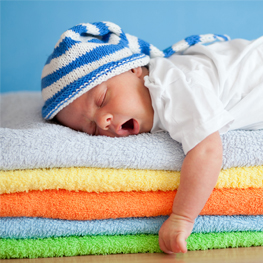
Your newborn is a unique person and will present you with a very individualized language. However, there are many similarities among babies. The majority of newborns signal tiredness in similar ways. Let’s talk about some of these common signals to give you a guideline as you begin the process of learning to read your baby’s language. Once you get through the first few months, you won’t need a list of any kind as you will learn how to read your baby better than anyone else in the whole entire world. But in the meantime, knowing what things to look out for can speed the translation process.
Signs that your baby may be tired:
Other factors that include tiredness:
Signs that your baby might be overtired:
Other factors that can indicate overtiredness:
What to do when your newborn is tired
Newborn Happily Awake Span
How do you help your newborn to be happier, sleep better, and be more peaceful? Respect your baby’s Happily Awake Span!
The length of time that your baby is awake from one sleep period to the next will have a powerful impact on her temperament and behavior. It will also affect how easily your baby falls asleep and how well she sleeps, so it is a very important consideration.
Newborns shouldn’t stay awake for very long:
I call this the “happily awake span” because your baby can stay awake longer, but typically if she does, she’ll be unhappy - fussing and crying and working herself up so much that it’s hard for her to fall asleep, yet hard for her to stay awake. It’s an unpleasant situation for babies and their caregivers, too!
Long awake times can be detrimental to your newborn:
Short awake periods = Happier baby
If you want your baby to be peaceful, to cry less and sleep better, keep one eye on your baby and one eye on the clock. Perhaps even set your phone to buzz as a reminder that sleep time should be near - then watch for those tell tale tired signs. Don’t let your newborn stay awake for too long at a time and sleep will come peacefully for her at the right times.
Elizabeth is a mother of four, and author of the bestselling No-Cry Solution series on topics such as sleep, discipline, picky eating, and potty training. She is known worldwide as the voice of practical, respectful parenting. Check out her latest book available to purchase on Amazon, The No-Cry Sleep Solution for Newborns. For more information, visit elizabethpantley.com.
Calgary’s Child Magazine © 2024 Calgary’s Child